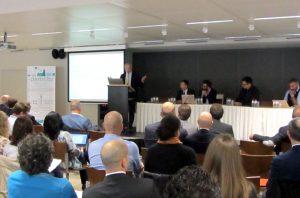
The first workshop for the DEMETO project, held Sept. 28 in Brussels.
The European Union will invest millions of euros into advancing a microwave depolymerization technology for PET container scrap and polyester in discarded textiles.
The project, called Depolymerization by Microwave Technology (DEMETO), recently kicked off at an event in Brussels. DEMETO’s goal is to push a technology developed by gr3n, a Swiss company, to industrial scale.
The technology uses microwaves in an alkaline hydrolysis depolymerization reaction. PET is separated into its building blocks, ethylene glycol (EG) and purified terephthalic acid (PTA), so they can be reused to make virgin PET. The use of microwaves helps overcome economic challenges in using the hydrolysis approach.
“DEMETO proposes the industrialisation and demonstration at full-scale of a new industrial process which allows to chemically recycle PET bottles, food containers and even textiles in a highly profitable and environmentally sustainable way,” Maurizio Crippa, CEO of gr3n, stated in a press release.
The focus at the start of the project will be colored PET bottle scrap, but the technology can be applied to difficult-to-recover PET streams, as well. Clothing company H&M and the European Outdoor Group, a sporting goods industry association, are among the 13 project partners.
The project is coordinated by the Italian company Processi Innovativi, which will build the full-scale depolymerization plants. The reactors will be supplied by gr3n.
The project received funding through the European Union’s Horizon 2020 research and innovation program. Of the total estimated 9.9 million euro (about $11.7 million), nearly 80 percent is funded by the European Union.
Microwaves have potential for reducing costs in depolymerization processes, which can otherwise be energy intensive. In Canada, startup Pyrowave is using microwaves to produce styrene monomers from polystyrene scrap.
To receive the latest news and analysis about plastics recycling technologies, sign up now for our free monthly Plastics Recycling Update: Technology Edition e-newsletter.
More stories about technology
- Glacier AI at Penn Waste aims to improve PET, fiber output
- APR launches recyclability assessment platform
- Closed Loop invests $10M in recycler GreenMantra